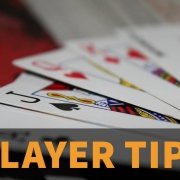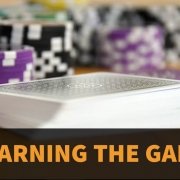Rules, Rules, Rules..Know Them!
Happy New Year poker fans! I hope your 2014 was fruitful and you rang in 2015 in style!
I’m usually not a fan of New Years’ resolutions, but this is the perfect time to make a promise to yourself to improve your poker game. Many people are hesitant to spend time improving their game. Some of the most common reasons I hear include:
1. Not having enough time
2. Thinking that improving one’s game is only for serious players
3. I’m just a casual player so why bother?
4. Simply not knowing how to go about it
Well let me solve those for you right now. You’re reading this article so you do have enough time. Everyone can benefit from improving their game. I’m going to show you a simple way to improve poker game fundamentals that will make you a better player by the time you’re done reading this post. Do we have a deal? Good.
Here are three words that will make you a better, more skilled player:
KNOW YOUR RULES!
Well thanks a lot captain obvious, how is that going to make me a better player? Let me explain. Knowing your rules means a lot more than simply knowing the rules of poker. Poker is not a black and white game. Poker is almost entirely played in the gray area. We seldom have all the information we need to make the most informed strategic decisions when playing a game of poker. Situations change and your decisions change with them. Rules are no different. Have you ever taken the time to read the rules of the game at your local casino? Any good casino will have them readily available. The California Grand Casino has fliers with all of the games, rules, and information available at the side of the information desk, as well as official copies that are laminated and chained to the right side of the main cage. If you’ve taken a look, it can be a bit overwhelming. Rules and interpretations of those rules vary from casino to casino, and rules even change at the same casino over time. The price you pay for not knowing the rules specific to your game at your casino can be steep. You might get away with making an easily correctable mistake, or it may end up costing you your whole stack! Here are a few quick examples of the types of rules that can vary from casino to casino, that you want to make sure you know before you sit down at the table.
Raising/String Bets
This is important in Limit, and even more critical in No-Limit. The things you want to make sure you know are:
1. Is there a betting line and how is it used to enforce bets?
2. How much do you need to put in the pot for it to be considered a raise? (Limit: Half of a raise or more? No-Limit: all of the raise? A specific percent of the raise facing you?)
3. Are you allowed to declare raise and then put out the call first while maintaining your ability to raise whatever amount you want?
4. How many raises cap the action (Limit only)?
5. Is it the responsibility of the players or the dealer to call a string bet?
Seat Changes
Where you sit at the table in relation to the other players is extremely important. If you don’t know why, I wrote about it here. You need to know if there is a seat change list (and how it works), if there are seat change buttons, if players cut for a seat, or if it’s simply first to request it or lock it up. Don’t be shy, speak up and ask a dealer, floor-person, or even a regular player.
Lobbying
The last thing you want to do is lose your seat in a game or lose a couple chips because you aren’t clear about what the lobbying rules are. Some places take a lobbying fee from your stack. Some places allow you to miss three orbits (the button moving around the table and returning to the same spot is considered one orbit), while others give you a set time limit (ask the floor-person if you need longer and they may cut you some slack). Be sure to know how it works where you play.
Tournaments
Some rules are different in tournaments than they are in cash games. Find out before you sit down or it could cost you dearly. In some tournaments, if you are on your phone or not in your seat when the cards are dealt to you, your hand is dead. Don’t let that happen to you. Swearing and other unseemly behavior can cause you to miss an entire orbit or sit out for a period of time as a penalty. Thankfully you would never do such a thing, but just in case…I thought I’d mention it.
Knowing the rules of the game is such a simple thing and yet many people don’t take the extra time needed to make sure they understand how things work where they’re playing. Always ask someone about the rules when playing somewhere new and be sure that you know the rules inside and out wherever you play regularly. You’ll avoid costly mistakes and that helps improve your bottom line.
Until next time, see you at the tables!




